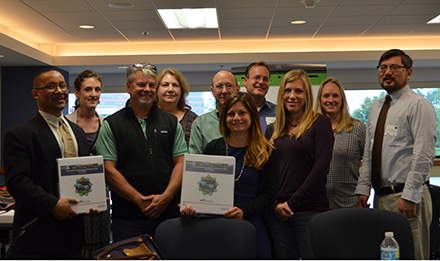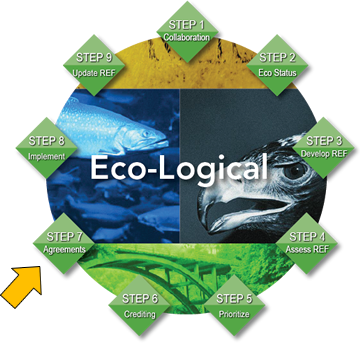Eco-Logical Peer Exchange: Mitigation Approaches for MPOs; June 2-3, 2015
Activity Report

The Federal Highway Administration (FHWA) and the American Association of State Highway and Transportation Officials (AASHTO) are jointly leading an effort to develop tools and resources for State Departments of Transportation (DOTs) and other agencies that are interested in Implementing Eco-Logical into their programs. This activity report summarizes the discussions held at the Mitigation Peer Exchange with MPOs, held in Arlington, Virginia, on June 2-3 at the National Highway Institute.
Peer Exchange
AASHTO and FHWA hosted a peer exchange on programmatic mitigation with MPOs at FHWA National Highway Institute on June 2nd-3rd. The participants were from East-West Gateway Council of Governments, Metropolitan Transportation Commission, North Central Texas Council of Governments, San Diego Association of Governments. Guest speakers included Lauren Diaz and Steven Martin from the U.S. Army Corps of Engineers (USACE) and Deborah Mead from the U.S. Fish and Wildlife Service (USFWS). MPO participants discussed their programmatic mitigation needs and exchanged dialogue with other participants to help advance their programs.
The discussion at the mitigation peer exchange focused on Step 7 of the Eco-Logical Approach. Each participant explained the current status and goals of their mitigation program. Subject matter experts from USACE and USFWS explained mitigation approach options and provided information to answer participant questions.

Peer Exchange Agenda
- Peer exchange objectives
- Background discussion on each MPO’s mitigation programs, successes, and challenges
- Process to establish a migration bank
- Relationships in Mitigation Approaches
- Legal, Regulatory, and Administrative Challenges
- Funding a mitigation program/the business of banking
- Date and tools for site identification
- Next steps: Action Planning
Participants
Helpful Reference Materials
Topics of Discussion
General Mitigation Discussion
- Who in your agency is involved in mitigation? In Eco-Logical?
- Are planning staff involved? Why or why not?
- How does your management engage with mitigation? With Eco-Logical?
- Does this reflect your overall MPO management or just your division/department?
- What is your region’s history with mitigation programs?
- What are the most valuable natural resources in the region?
- Who are the “champions” of mitigation programs in the region?
- What have been (or do you anticipate to be) the greatest barriers to a successful mitigation program in your region?
General Eco-Logical Discussion
- What prompted your agency to get involved with Eco-Logical?
- What parts of the Integrated Ecological Framework (IEF) are the most successful for your agency?
- Have you established a Regional Ecosystem Framework (REF)?
- How have you used this in relation to mitigation activities?
- How do you plan to use the REF to support future mitigation?
Discussion Topic 1: Process to establish a mitigation bank
- Does this process resonate with your experience? Why or why not?
- How many of these steps has your MPO followed?
- What additional steps would you recommend?
Discussion Topic 2: Relationships in mitigation approaches
- How would you characterize your relationship with your State DOT?
- In general?
- In relationship to mitigation approaches?
- Does your State DOT have an active mitigation bank, In-Lieu Fee program, or other mitigation approach?
- How do they educate or involve MPOs in this program?
- How are State and Federal resource and regulatory agencies involved in this program?
- How does the State DOT mitigation program meet (or not meet) your MPO needs?
- How would you characterize your relationship with local government agencies? What type of staff do you work with (transportation, public works, environmental, land use, etc.)?
- What new relationships will you need to form to have a successful mitigation program?
Discussion Topic 3: Funding a mitigation program
- What funding mechanisms have worked for MPOs?
- What funding mechanisms will not work for your MPO? Why?
- What authorities or regulatory constraints govern funding for a mitigation program?
Discussion Topic 4: Legal, regulatory, and crediting strategies
- For those with established programs, what legal resources helped you get your program started?
- What types of legal resources or advice do you need for program management?
- Are there special regulations in your State that govern regional mitigation programs?
- Are there any questions about Federal regulations for mitigation programs?
- How do you establish fees for credits?
- Who is involved and has the final decision in determining credits and fees?
Discussion Topic 5: Data and tools for site identification
- Describe your MPO’s GIS capacity and staff.
- Describe the type of resource data available in your region.
- What are the sources of this data?
- How frequently is it updated?
- How do you establish ecological suitability of a mitigation site?
- What are the roles of the MPO and partner agencies in establishing suitability?
Next Steps
The next steps for each of the attending MPOs are to bring back the information they learned from the peer exchange and apply it to their program. And, contact information was shared so each attendee can follow-up with their new DOT partner from the peer exchange!
Need to request technical assistance for your Eco-Logical program? Please submit a request.

